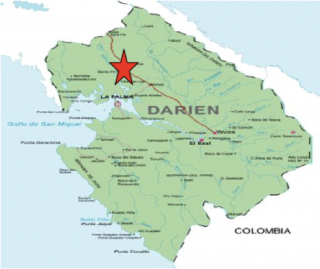El Tirao, Panama
![]()
![]()
![]()
![]()
![]()
![]()
![]() Click on Programs to learn more about their work in this community
Click on Programs to learn more about their work in this community
General Information

| Population* | 463 |
| Number of homes | 130 |
| Avg # of people per home | 3-4 |
| Electricity | Yes |
| Corregimiento | Agua Fria |
| District | Chepigana |
| Corresponding Health Center | Santa Fe |
| Distance from compounds | N/A |
| Road conditions | Excellent |
* Population does not reflect how many patients will be seen on medical
brigades as many people from surrounding communities come seeking
Medical Brigades medical attention.
Expressed Needs and Capacities
The community of El Tirao is a Latino community in rural eastern Panama. The community's main complaints are the water system, the inadequate waste management system, and the public health needs within the homes.
El Tirao has one primary school that holds grades one through six for children and also hosts night school for adults. There are four teachers, four classrooms, a kitchen, and a cafeteria. The school is located very near the Pan-American Highway and children in the community must travel to Zapallal in order to attend secondary school. Ninety-five percent of community member in El Tirao are literate.
El Tirao has a gravity-based aqueduct water system. However, they frequently encounter issues with the piping because there is no regular maintenance and breaks in the system occur. Although 100% of the community is connected to the system, the water is not properly chlorinated.
El Tirao does have a small health post located within the community, staffed with one health assistant trained by the Ministry of Health (MINSA). The nearest full-service health center is located in the town of Santa Fe. The cost of traveling to Santa Fe from El Tirao on public transportation is approximately $2.00 each way. The three most commonly presented health issues in the community are colds, diarrhea and dermatological diseases. Most of the community members have pit latrines and approximately 20% of community members have dirt floors in their homes.
The men in this community typically earn their livelihoods through agriculture - predominantly growing rice and yucca, and through raising cattle. The majority of the community members have access to credit through the National Bank. This community currently lacks a financial cooperative.
Currently a reliable waste management infrastructure does not exist in this community. Open-air burning is the most common practice for trash disposal. The community does have access to a trash collection system; however, the pick-ups are inconsistent and costs $2.00 per trash bag.
Prior to Human Rights Brigades, none of the community members had ever received legal assistance. Currently, only 25%-50% of the community members hold titles for their land.
The community follows the general administrative government structure of Panama.
Medical, Dental and Human Rights Brigades are currently working in the community of El Tirao.
Source of information: Key informant interview
Date of interview: July 15th, 2011
Last Visited: February 25, 2014
Last Updated: February 28, 2014